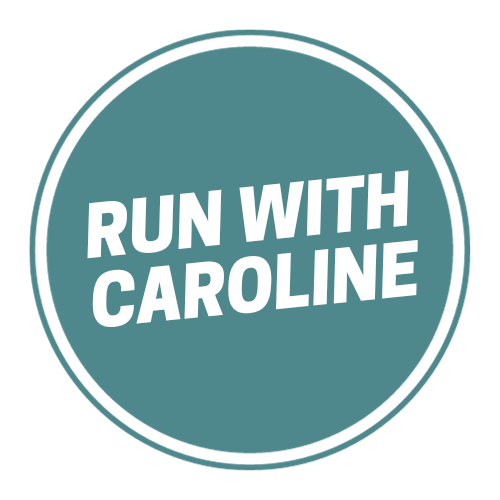If you’ve ever dreamt of conquering your first 2 hour half marathon in under two hours, you’re in the right place!
I remember when I first ran my first sub-2-hour half marathon – all the training had been worth it as I crossed the finish line.
I experienced feelings of overwhelm, excitement and exhaustion all in one go!
There’s no doubt, embarking on this exciting journey requires dedication, preparation and a solid game plan.
It’s a journey filled with ups and downs, blood, sweat and tears (and a few bruised toenails).
In this guide, I’ll break down the essential steps to help you achieve that elusive sub-2-hour milestone.
Remember to embrace the process! Running is supposed to be fun – not a chore!
And crucially celebrate your progress – every step brings you closer to realising your goal of running your first 2 hour half marathon.
Ready?
Let’s go!

How to run your first 2 hour half marathon
#1 Set realistic goals
Before you start your half marathon training, it’s crucial to set realistic and achievable goals.
What do I mean by this? It’s about understanding if a 2-hour half marathon is a realistic and achievable goal for YOU.
If your current half marathon time is way above 2 hours, or if it’s your first ever half marathon, then running a 2-hour half marathon may be a big leap forward for you.
In order to run a 2 hour half marathon, you need to run at a pace of at least 9:10 minutes per mile / 5:42 minutes per kilometre.
This is totally doable with the right amount of training, but you’ll first want to assess whether you’re able to make the necessary sacrifices over the next 3 to 4 months and commit to your half marathon training.
If you’re not to far away from running a 2 hour half marathon, and you’ve completed various 5k, 10k and half marathon races, then running your first sub-2-hour half marathon may be a breeze.
The bottom line? A 2-hour half marathon time is a realistic goal if you can run a 10k in 55 minutes or less and your weekly average mileage is at least 20 miles per week.
It’s crucial you understand your current fitness levels and running pace and tailor your expectations accordingly.
And remember, aim for progress, not perfection, and remember that your journey is unique!
Don’t compare yourself to any other runner – this is a one-way ticket to stress and anxiety!
Run your own race and believe in your abilities as a runner.
Related: Training for a half marathon? Here are 15 tips to make training easier
#2 Build a strong foundation
To tackle a half marathon successfully, you need a solid foundation from which to build from.
You must first build your endurance and stamina and cardiovascular fitness.
Studies have shown that in half‐marathon runners, a high training volume and a long endurance runs were associated with faster finish times.
Gradually build up your mileage by incorporating a mix of easy runs, long runs and speed workouts into your training plan.
A suitable half marathon training plan usually spans 12 to 16 weeks, allowing your body to adapt to the increasing demands of distance running.
You can use any of my half marathon training plans to help you:
- Couch to half marathon training plan
- Beginner half marathon training plan
- Intermediate half marathon training plan
Related: The ultimate couch to half marathon training plan

#3 Plan your training schedule
Consistency is key when it comes to preparing for a half marathon, especially if you want to run it in 2 hours or less.
Create a realistic training schedule that aligns with your lifestyle.
Fitting your schedule in with your lifestyle will give you a greater chance of completing your training runs.
Include 3 to 4 running days per week, intermixed with cross training activities like cycling or swimming and strength training to reduce the risk of injury and enhance overall fitness.
More importantly, don’t forget about the all important rest days.
On rest days, you should be doing exactly that, resting!
You may want to some some active recovery activities like walking and stretching, but nothing much more beyond this.
Related: 14 of the best half marathons in the US
#4 Incorporate speed work
To break the 2-hour barrier, you’ll need to include speed work in your training routine.
Interval training, tempo runs and hill sprints will improve your running efficiency and boost your cardiovascular fitness.
I personally really enjoy Fartlek training as it’s a great way to add variety into any training routine.
Aim for 1 to 2 speed workouts per week, gradually increasing the intensity as you progress through your training program.
Related: What is a good half marathon time? Average half marathon times by age and gender
#5 Strengthen your core and muscles
A strong core and well-conditioned muscles are vital for long-distance running.
Include strength training exercises in your regimen to improve stability and reduce the risk of injuries.
As soon as I started to include strength training in my training routine, it was a game changer for me.
I experienced way less running injuries and I felt generally stronger on and off the running track.
Focus on exercises targeting the core, hips, glutes and legs to enhance your overall running performance.
Related: Intermediate half marathon training plan: Week by week plan + printable

#6 Pay attention to nutrition
Proper nutrition plays a pivotal role in your training and race day performance.
Fuel your body with a balanced diet that includes a mix of carbohydrates, protein, healthy fats and ample hydration.
Experiment with nutrition strategies during your long runs to find what works best for you, ensuring you’re well-fuelled and energised on race day.
Related: How long is a half marathon? Training plans + 7 tips for race success
#7 Master the art of pacing
Effective pacing is the key to maintaining energy throughout your half marathon, and once you master pacing, it can really be a game changer.
It takes the guesswork out of how fast you should be running.
As I mentioned earlier, in order to run a 2 hour half marathon, you need to run at a pace of at least 9:10 minutes per mile / 5:42 minutes per kilometre.
It’s important that you practice pacing during your long training runs to develop a sense of your ideal speed.
Typically, you’ll want to run a little faster than this during your training.
Start at a comfortable pace, gradually increasing to your target race pace.
Avoid the temptation to start too fast on race day – conserving energy early on will pay off in the later stages of the race.
Related: 5 rules for half marathon training
#8 Hydration and recovery
Hydration and recovery are often underestimated aspects of half marathon training.
Stay adequately hydrated during your runs and practice your hydration strategy on long training days.
Dehydrated muscles can often cause fatigue, cramping and heavy legs – so keep your water topped up!
Post-run, prioritise recovery with sufficient rest, stretching and foam rolling to ensure your body is ready for the next workout.
Related: Half marathon training plan for beginners: Week by week plan + printable

#9 Mental preparation
Running a half marathon is as much a mental challenge as it is physical.
Develop mental resilience by visualising your success, setting positive affirmations and staying focused during training.
You are undoubtedly going to have moments of self-doubt, but it’s key that you push past these moments.
On race day, break the distance into manageable chunks and celebrate each milestone.
Your mental strength will carry you through when the going gets tough.
Related: Half marathon checklist: 6 of the best running accessories for half marathon training
#10 Race day strategy
As the big day approaches, finalise your race day strategy.
I like to have a gear checklist in the week leading up to the race.
Lay out your gear the night before, plan your pre-race nutrition and aim to get a good night’s sleep.
You’ll also want to plan your journey to the race to make sure you avoid any last minute hiccups.
Start the race confidently, stick to your pacing plan and stay mentally tough when fatigue sets in.
Enjoy the experience and embrace the sense of achievement as you cross the finish line – it’s the best feeling ever!
Related: What do I need on race day? The ultimate running race day checklist
- 5 things I wish I’d known before returning to running - March 3, 2024
- Running 20 minutes a day: Benefits + how to start - January 27, 2024
- How to run your first 2 hour half marathon - January 16, 2024
